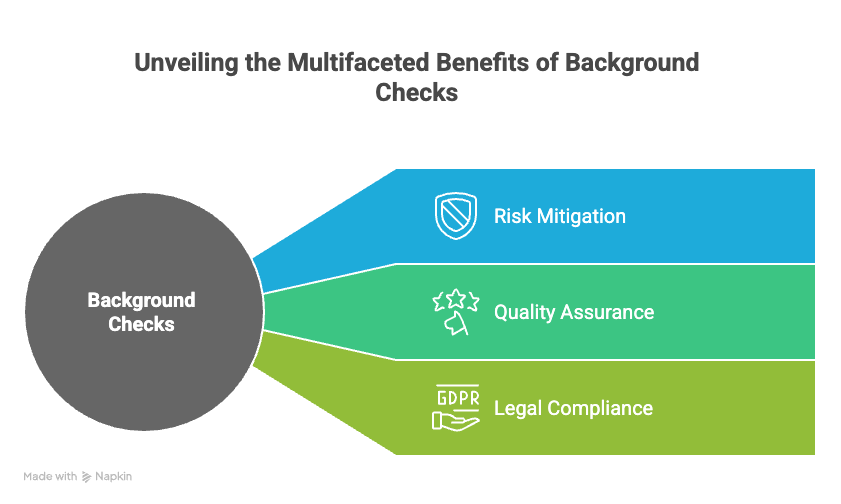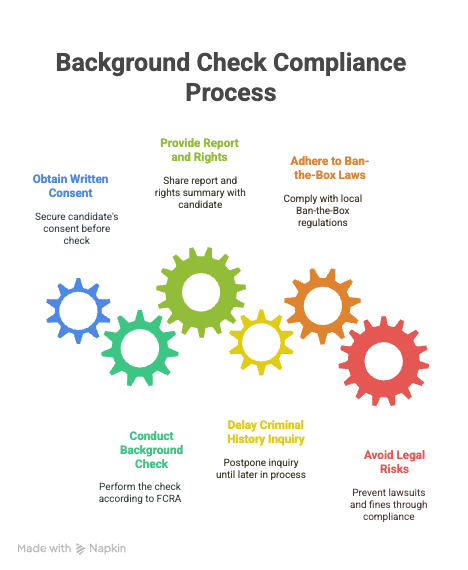Effective staffing is no simple task, especially when it comes to ensuring your candidates are right for the role. One critical aspect to consider is when to conduct background checks. Proper timing can safeguard your organization from potential risks while also ensuring compliance with legal requirements. Here, we delve into the nuances of timing background checks in staffing, covering various strategies and compliance guidelines.
Key Takeaways
- Background checks help you verify candidate qualifications and protect your company from potential risks.
- Timing these checks carefully is essential to comply with laws and maintain a fair hiring process.
- Considering laws, like Ban-the-Box and the Fair Credit Reporting Act, helps you avoid legal issues.
- Performing background checks post-offer respects candidate privacy and aligns with many legal requirements.
- Regularly updating your policies and training team members keeps your hiring process compliant and effective.
Introduction
Background checks play a critical role in the staffing process. They help you confirm your candidate's qualifications and safeguard your workplace. But timing these checks effectively is just as important as conducting them. When and how you run these checks can impact legal compliance and ensure you choose the right candidates.
Timing background checks involves strategic planning. You're not just looking at whether a candidate meets the job requirements; you're also respecting their privacy and adhering to regulations. This balance is crucial, as poor timing can open the door to legal challenges or result in hiring a mismatch.
This guide outlines the factors to consider when timing background checks within your staffing process. From understanding legal frameworks to implementing best practices, you'll find actionable insights to optimize your approach and protect your organization's interests.
Importance of Background Checks in Staffing
Background checks are a crucial element in the staffing process. They help mitigate risk by uncovering past behavior that might predict future problems. When you verify a candidate's history, you prevent hiring fraud and gain insight into their trustworthiness. Imagine the headache of discovering after the fact that a new hire has a history of workplace misconduct or fraud. A simple background check can shield your organization from such pitfalls.
Quality assurance is another compelling reason to use background checks. They help verify the qualifications and experiences that candidates claim. This process can filter out applicants who might have overemphasized their qualifications on their resumes. For instance, you might encounter a candidate who claims a degree they never earned. Catching this early saves your organization from the challenges of misrepresented skills.
Lastly, background checks are not just about peace of mind. They are a legal necessity. The Fair Credit Reporting Act (FCRA) lays down strict rules about how and when you can use this information. Breaching these can lead to severe penalties. Checking backgrounds also aligns with industry-specific regulations. Keeping your process compliant ensures you avoid legal issues and fosters a fair hiring environment.

Have you experienced the difficulties of discovering undisclosed information too late? Or had a hire turn sour because credentials were not cross-verified? Background checks are your first line of defense in ensuring a reliable and competent workforce. Are you using them to their full potential?
Key Considerations for Timing Background Checks
Choosing the right time to perform background checks is vital. The timing can influence the hiring process, affect compliance, and determine the overall candidate experience. Let’s break down when you might want to conduct these checks and the implications of each approach.
Before Job Offers
Conducting background checks before extending a job offer has its pros and cons. A major advantage is reducing the chance of hiring fraud. Knowing a candidate's background early in the hiring process can prevent potential workplace issues. You'll be aware of any discrepancies upfront, allowing for honest discussions.
However, pre-offer background checks can lead to legal complications. Many states have Ban-the-Box laws that restrict asking about criminal history before a job offer. Violating these laws could result in legal penalties. It’s crucial to check your specific local laws before proceeding with pre-offer screenings.
Striking a balance is key. Ensure you’re compliant with local regulations while assessing candidates thoroughly. This approach can align with maintaining fairness and honesty in your hiring process.
Post-Offer Background Checks
Performing background checks after a job offer is common practice. One reason is it generally aligns better with the Fair Credit Reporting Act (FCRA) guidelines. Most candidates have an offer contingent upon a satisfactory background check, which creates a legal safety net for your organization.
This approach also respects applicants’ privacy more by ensuring they don’t undergo unnecessary scrutiny before their qualifications are reviewed. It can simplify the onboarding process, as candidates have already been conditionally approved.
Implementing post-offer checks requires clear communication with candidates. They should understand that job offers depend on the results, ensuring transparency and setting the right expectations from the start.
Both methods have their merits and drawbacks. The ultimate decision depends on your company’s needs, legal requirements, and the kind of candidate experience you wish to offer. Ensure you have a solid policy in place to guide your process consistently and legally.
Legal Framework and Compliance
The Fair Credit Reporting Act (FCRA) sets the stage for any background check process in the U.S. It mandates that you must obtain written consent from the candidate before conducting a check. If you decide not to hire someone based on the report, you're required to provide them with a copy and a summary of their rights under the FCRA. This not only safeguards applicants but also ensures transparency in hiring.

Ban-the-Box laws vary by jurisdiction and can significantly impact your timing options. These laws typically require you to delay inquiries into a candidate’s criminal history until later in the hiring process. For example, in California, you cannot ask about criminal records until a conditional offer is made. Ignoring these regulations can lead to lawsuits and fines, stressing why it’s crucial to stay informed about local legislation.
Consider a case from 2020, where a retail company was sued for conducting pre-offer background checks in a state with strict Ban-the-Box laws. They paid hefty settlements and faced public backlash, illustrating the importance of compliance.
By adhering to FCRA guidelines and understanding Ban-the-Box laws, you're not just protecting candidates; you're shielding your organization from legal risks. Keeping abreast of these regulations can help you avoid costly mistakes and enhance your hiring process's integrity.
Strategies for Effective Screening Timing
Your approach to screening timing should reflect the specific needs of each role. High-security positions, like those in finance or data management, might require earlier checks to ensure integrity. Contrast this with positions where the risk is lower, and you may find a different timing strategy is adequate.
Integration is key. Your background checks should align neatly with your hiring workflow. This means setting clear points in your process when checks are initiated, reviewed, and completed. Look at your candidate journey and find natural stages where a check can be completed without disrupting the process.
Technology can be a significant ally here. Use automated background check tools to reduce turnaround times and keep the process moving efficiently. With the right software, you can track progress, receive alerts for required action, and maintain compliance effortlessly.
Are you tailoring your background check timing to the role's specific demands? Consider the workflow integration and tech tools at your disposal to streamline this crucial step in staffing.
Best Practices and Recommendations
Creating a clear and comprehensive background check policy is essential. This document should outline the types of checks that will be conducted, the timing for each step, and the roles for which different screenings are applicable. Clearly define responsibilities, and establish procedures for handling any adverse information that arises.
Staying informed about legal changes and industry trends is crucial. Employment laws, especially those pertaining to background checks, can change frequently. Regularly update your policy to reflect such changes, and ensure your team is aware of new requirements. This will help protect your organization from compliance issues and keep your hiring practices up to date.
Training and education for HR and staffing managers are vital. They should be well-versed in current legal requirements, industry standards, and the nuances of conducting background checks. Equip them with the skills to execute these processes efficiently and fairly. Regular workshops or online courses can ensure they remain knowledgeable and competent.
Consider these strategies as practical steps to strengthen your hiring process. Engaging in regular reviews and updates not only ensures compliance but also elevates the overall integrity of your staffing operations. Are your current policies aligned with the best practices in the industry? How can you leverage education to enhance your team's competency in background screenings? Reflecting on these questions can guide improvements in your approach.
Conclusion
A successful staffing strategy hinges on timing when it comes to background checks. We've explored how grounding your screening process in solid practices can protect your organization. From understanding the impact of Ban-the-Box laws to aligning with FCRA guidelines, the timing of background checks plays a critical role. Each method has its strengths and limitations, demanding a tailored approach for every role and jurisdiction.
As you refine your hiring process, consider integrating a comprehensive background screening strategy. Consistent updates and awareness of legal changes can set a strong foundation. An informed HR team can execute this process with precision, ensuring compliance and quality.
Now is the time to review your background check procedures. By leveraging the strategies and insights discussed, you can enhance your staffing efforts, safeguarding both your organization and potential hires.
Additional Resources
To deepen your understanding of the timing and implementation of background checks, explore these resources:
- Visit our company's blog for a range of articles that dive into background checks and staffing strategies. These resources are tailored to keep you informed about the latest trends and best practices in the industry.
- For authoritative advice, refer to the Federal Trade Commission’s guidelines on background checks. The FTC provides comprehensive insights into legal compliance and practical tips for employers navigating the complexities of screening candidates.
Frequently Asked Questions (FAQs)
When Should Staffing Agencies Conduct Background Checks?
Staffing agencies should conduct background checks after a conditional job offer is made. This ensures that potential employees are evaluated based on their qualifications and experience first.
Can Staffing Firms Screen Candidates Before a Job Offer?
Yes, but it may not be advisable. Pre-offer screening can lead to potential legal challenges, especially in jurisdictions with strong privacy laws. Conduct checks post-offer to minimize risks.
How Do Ban-the-Box Laws Impact Screening Timelines?
Ban-the-box laws delay criminal background checks until later in the hiring process, typically after a conditional offer. This helps ensure fair treatment for candidates with criminal histories.
What Are the Risks of Early vs. Late Background Checks?
Early checks can lead to legal issues and accusations of discrimination. Late checks might waste time if a candidate doesn’t pass. Balancing timing is crucial for efficiency and compliance.
How Does Screening Timing Affect Candidate Experience?
Timely screening can enhance the candidate’s experience by reducing stress and uncertainty. Communicate clearly about when checks will occur to keep candidates informed and engaged.
How Can Staffing Agencies Ensure Compliance with Background Check Laws?
Stay updated on local, state, and federal regulations. Set clear internal policies and train staff regularly to ensure adherence to legal and ethical standards.
Can Candidates Withdraw Consent for Background Checks?
Yes, candidates can withdraw consent, but this could affect their job prospects. Transparency about the process can help mitigate hesitations.
What Should Be Included in a Background Check?
Checks typically cover criminal records, employment history, and education credentials. Depending on the role, you might also include credit reports and drug testing.
How Long Does a Background Check Take?
The process usually takes between three to five business days, but it can vary based on the depth of the check and the location of the candidate.
What Happens if a Background Check Reveals Discrepancies?
If discrepancies arise, give candidates a chance to explain. Often, issues stem from misunderstandings or errors that can be clarified before making a final decision.
Definitions
Background Checks
A background check is the process of verifying a job candidate’s personal, professional, and sometimes criminal history. It can include reviewing employment records, academic credentials, credit reports, and criminal records. Employers use this information to confirm qualifications and assess potential risks. For example, hiring someone for a financial role might require a deeper review of criminal and credit history.
Fair Credit Reporting Act (FCRA)
The FCRA is a U.S. law that governs how employers can collect and use consumer information in background checks. It requires you to get a candidate’s written consent before the check and to notify them if any decision is made based on the findings. Providing a copy of the report and a summary of rights is also mandatory. Not following FCRA rules can lead to legal issues and penalties.
Ban-the-Box Laws
Ban-the-Box laws restrict when an employer can ask about a candidate's criminal history. These laws typically prevent inquiries until later in the hiring process—often after a job offer is made. They aim to give candidates a fair chance to be considered based on qualifications first. Laws vary by state and city, so it’s important to know the rules in your hiring locations.
Conditional Job Offer
A conditional job offer is an offer of employment that depends on the completion of certain requirements, such as a successful background check, drug test, or reference check. It helps you move qualified candidates forward while retaining the right to withdraw the offer if issues arise. It also aligns with legal frameworks like FCRA and Ban-the-Box.
Candidate Experience
Candidate experience refers to how job seekers perceive your hiring process—from the first job post to the final offer or rejection. Factors like communication, timing, and transparency all play a role. A smooth background check process that respects privacy and sets clear expectations can improve candidate satisfaction and help you attract stronger talent.
References
Still have questions?
Get in touch with our team today for a personalized demo and discover how our tailored volume pricing and packages can drive results for your business!
How useful was this page?*
Note: your comments are anonymous. We use them to improve the website. Do not include any personal details.
Visit our FCRA Compliance Tool or leave a message here if you need a response.
From the blog Explore the GCheck Content Hub

Employment Verification Compliance 2026: Strategic Guide for Modern HR Teams
29 Dec, 2025 • 17 min read
What Shows Up on an Employment Background Check in 2026: A Complete Compliance Guide
29 Dec, 2025 • 20 min read
How to Run a FACIS Background Check: Complete Guide for Healthcare Compliance
18 Dec, 2025 • 20 min readThe information provided in this article is for general informational and educational purposes only and should not be construed as legal advice or a substitute for consultation with qualified legal counsel. While we strive to ensure accuracy, employment screening laws and regulations—including but not limited to the Fair Credit Reporting Act (FCRA), Equal Employment Opportunity Commission (EEOC) guidelines, state and local ban-the-box laws, industry-specific requirements, and other applicable federal, state, and local statutes—are subject to frequent changes, varying interpretations, and jurisdiction-specific applications that may affect their implementation in your organization. Employers and screening decision-makers are solely responsible for ensuring their background check policies, procedures, and practices comply with all applicable laws and regulations relevant to their specific industry, location, and circumstances. We strongly recommend consulting with qualified employment law attorneys and compliance professionals before making hiring, tenant screening, or other decisions based on background check information.

